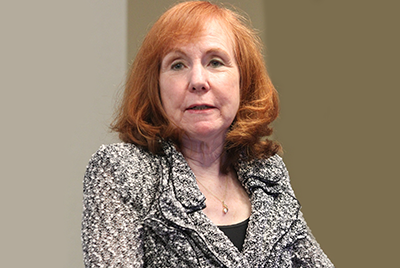Treating Depression in Youth Requires Systematic Approach, Says Expert

Depression in children and adolescents is different from depression in adults, said Karen Dineen Wagner, M.D., Ph.D. (pictured above), a professor and chair of psychiatry and behavioral sciences at the University of Texas Medical Branch, Galveston, at APA’s 2016 Annual Meeting today.
Presentation, evaluation, and treatment all require subtle but significant shifts in thinking, she said.
“Depression usually presents more often with irritability than sadness, compared with adults,” said Wagner. Frequently, depression is comorbid with other problems common to young people, such as anxiety, ADHD, conduct disorder, substance use, or anorexia.
Screening can be done with the Mood Disorder Questionnaire-Adolescent, a modification of the PHQ-9. After some trial and error, Wagner and colleagues found that parents’ responses to the questionnaire were more useful than either the adolescents’ answers or an “attributional” form that asked what teens thought their friends or teachers might be saying about them.
As for treatment, only two drugs are approved for use in children by the Food and Drug Administration (FDA), fluoxetine for ages 8 to 17 and escitalopram for ages 12 to 17, said Wagner. “The youngest age in the clinical trials determines the lower end of the approved age range. So what do you do if an 11-year old doesn’t respond to fluoxetine?”
One looks at other trials, she said, even if the FDA has not approved the drugs for pediatric use. For instance, one clinical trial found positive results for citalopram in ages 7 to 17, while two pooled trials of sertraline did so for ages 6 to 17.
Another issue with pediatric clinical trials is that 61 percent of youth respond to the medications, but 50 percent respond to placebo, compared with 30 percent among adults, making it hard to separate effects.
When parents express anxiety about using SSRIs and ask for psychotherapy, Wagner explains that cognitive-behavioral therapy (CBT) takes time to work and that a faster response can be obtained by combining an antidepressant with CBT. CBT can provide social skills and problem-solving techniques, as well. Wagner counsels patience once an SSRI is prescribed.
A 36-week trial of a drug is too brief, she said. “The clock starts when the child is well, usually around six months. Go for one year and then taper off to observe the effect.”
Finally, she suggested using an algorithm to plot treatment, beginning with an SSRI, then trying an alternative SSRI if that doesn’t work, then switching to a different class of antidepressants, and finally trying newer drugs if none of these works.
“We need to become much more systematic in treating depression,” she concluded.
(Image: David Hathcox)
|
|
|
|
|


